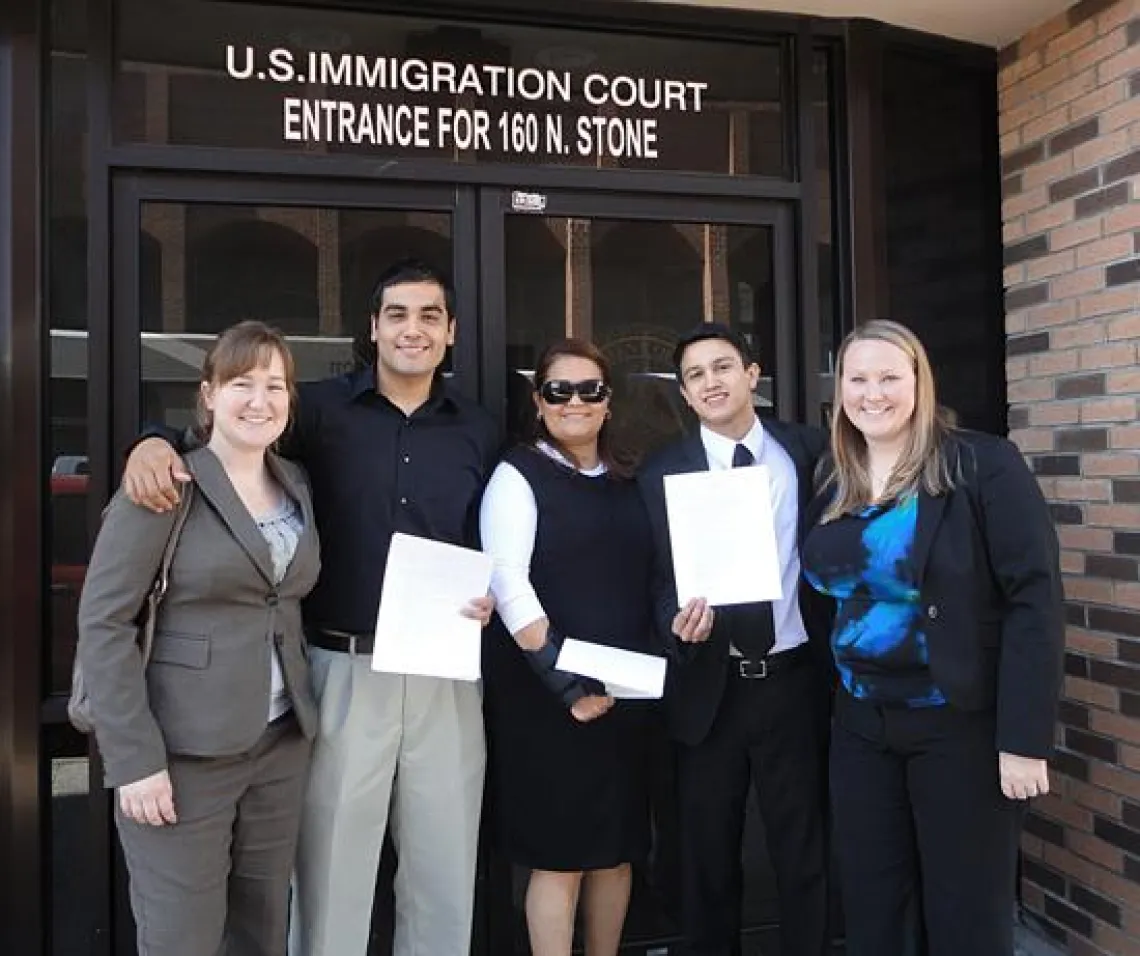
Immigration Law Clinic
This clinic is offered each Fall Semester.
At University of Arizona Law's Immigration Law Clinic, law students provide legal assistance to immigrants under the supervision of clinical faculty.
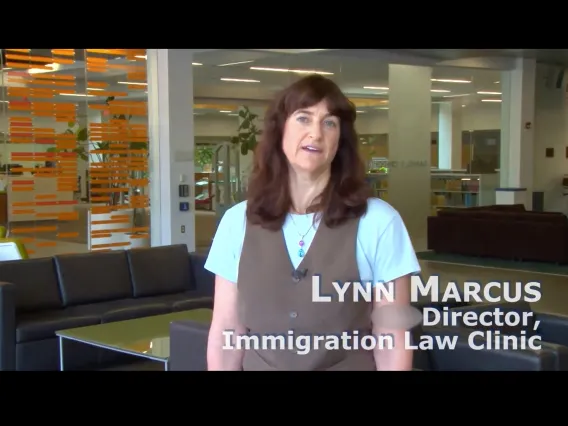
The Immigration Law Clinic Experience at Arizona Law
Watch this video to see how students in the Immigration Law Clinic gain experience while changing lives.
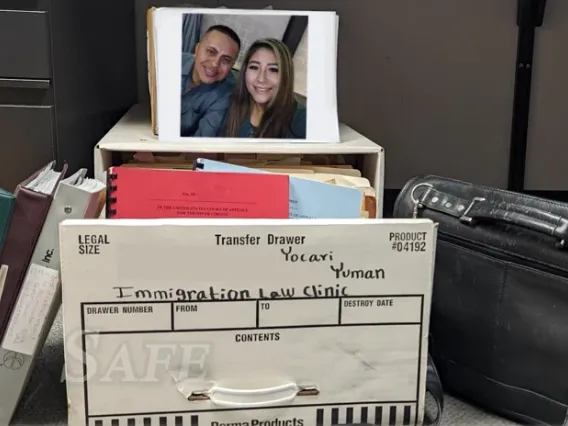
Safe?
Seventeen years after fleeing Guatemala as teenagers, a young couple has finally obtained visas that should lead to permanent residence. But misdemeanors in the husband’s past and increasingly restrictive immigration policies cast a pall over the future. Will evidence of good character and his family’s needs be enough to convince officials to let the husband stay with his wife and children in the U.S?
Clinic Details
Primary Goals
- Provide law students with a high quality legal education
- Serve the community by providing high quality legal services to indigent refugees and immigrants who would otherwise lack access to counsel
Educational Goals
We strive not only to help students increase their knowledge of the doctrines, institutions, and procedures unique to immigration law but also to help them develop expertise in:
- Client interviewing and counseling
- Working with people from culturally diverse backgrounds
- Collaboration
- Solving legal problems ethically and creatively
- Constructing persuasive legal arguments
Service Goals
Working in collaboration with non-profit law offices and pro bono attorneys in Arizona, we aim to help ensure that low income individuals with meritorious defenses to deportation or claims to immigration benefits are able to obtain accurate, nuanced advice about their cases and, whenever possible, direct representation. We also strive to meet the particular goals of each client, and to provide each with the highest quality of legal representation possible.
“The time I spent in the Immigration Law Clinic was some of the most valuable time that I have spent in law school. I was able to apply the law I learned in class in a real-world setting. Moreover, I learned about what it means to be an immigrant, how to have greater empathy, and how to collaborate with clients, peers, and different government and private organizations. The professors are very conscious of giving you the knowledge, techniques, and confidence to succeed; not only in your clinical work, but also in your future career.” -Gregg Lines, Class of 2016
“Being part of the Immigration Clinic is the most meaningful experience I have had in law school. Not only did I learn how to interact with clients, draft legal documents, and advocate for our clients, but I also felt fulfilled. The supportive clinic environment and close ties you build with the other students and professors make learning fun and easy." -Gabriela Corrales, Class of 2016
"I will never forget two extraordinary days from the immigration law clinic last year: the day our client was released from detention, and a few weeks later, when the judge granted her asylum. The feelings of pride, excitement and gratitude were unlike anything else I have experienced in law school, or even in life outside of school. The class component dovetails perfectly with the main case, so you have an opportunity to learn the nuts and bolts of an immigration case, and then immediately put them into practice. It was a truly inspiring experience that has reinforced my desire to go into immigration law." -Molly Kincaid, Class of 2013
"I have no doubt that I will remember my time in the Immigration Law Clinic for the rest of my legal career. Not only did I have the chance to gain invaluable practical experience representing my first client, but I also came away with new friends, mentors and inspiration. The clinic reinforced my commitment to continue fighting for those who are less fortunate." -Kristi Whitaker Trinks, Class of 2012
"The Immigration Law Clinic was the most enriching experience I have had in law school so far. We were afforded the opportunity to practice a wide variety of useful skills, including client interviews, trial prep and advocacy, brief writing, oral argument, and substantive immigration law research. The clinic was intense, emotional, and challenging, but the experience was absolutely invaluable. I would highly recommend it to anyone." -Ben Harville, Class of 2012
"The Immigration Law Clinic was, by far, my favorite experience in law school. It was a chance to get first-hand experience advocating for clients, to work closely with two awesome professors, and to put my legal knowledge to work. The clinic was one of the reasons I decided to go into immigration law after graduation, and the skills I gained come in handy every day at work." -Laura Belous, Class of 2010
"My time with the Immigration Law Clinic was the most rewarding part of my law school experience. The lessons I learned by taking on a real client's case (about interviewing techniques, working in a team, managing a case file and deadlines, and handling tough situations before a judge) have been more useful to me since graduation than anything I learned in a classroom. The clinic takes hard work, but I'd do it again without hesitation." -Eric Pavri, Class of 2009
"Participating in the Immigration Law Clinic was the most meaningful experience I had in law school. I had a chance to work on legal skills like interviewing, developing testimony, working with experts, and oral advocacy. Emilie Hyams [Class of 2006, far left] and I represented two sisters who were charged with alien smuggling, and with Professor Lynn Marcus's guidance, we were able to understand the reasons for their actions, which helped us develop a theory of the case. At the final hearing, it would have been impossible not to feel emotionally invested with so many family members present and unsure if they would be separated. After we won, I felt even greater respect for the clinic because of the important role it serves in the community in enabling law students to develop skills while defending indigent immigrants." -Jay Sagar, Class of 2005
(Note: A more thorough discussion of the requirements is contained in the clinic's training manual)
Students can take the clinic for four or six units of credit. The College of Law requires 50 hours of work for each credit of a clinical course. All students participate in an initial two-day training before the semester begins. In addition, all students attend the classroom component of the clinic, which meets for three hours once a week.
Classroom
The classroom component is partly a skills seminar (covering topics such as interviewing, brief writing, and preparing for trial), but also includes discussions of ethics and professional identity as well as of broader issues regarding immigration law and policy. Issues students confront in their casework are integrated into the classroom discussions so that students may learn from each others' experiences and explore legal and practical issues in context.
Casework
Students are assigned to work on an individual immigration case, usually in pairs. Students conduct all necessary legal and factual research, gather documents, and prepare the written application and other supporting materials. In addition to working on one main case, students will participate in a class project that involves providing information and advice to immigrants.
All students also prepare for and attend regularly scheduled individual supervision meetings with the clinic's directors. The purpose of these meetings is to develop and review case action plans; ensure thorough preparation and evaluation of all options in casework; and examine ethical, moral, cultural, and legal issues that arise in the course of the work.
In addition to attending class and completing the required number of hours per credit, students must complete all responsibilities they have undertaken on behalf of the clinic's clients and must complete and organize all case files.
Success Stories
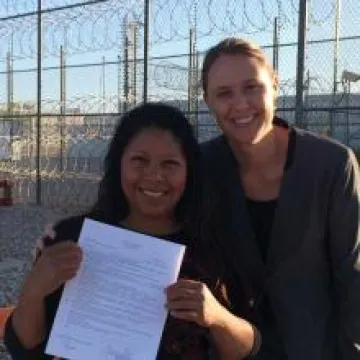
Kate Curl Reitz (Class of 2016) and Adrian Saenz (Class of 2015) won a rare asylum victory for a Central American woman detained in Eloy. They wrote a brief elucidating the complex law involving asylum claims based on domestic violence, conducted extensive interviews of our client and other corroborating witnesses, gathered expert declarations, and handled oral argument and direct examination in court. The client was granted asylum in May 2015 after spending more than one year in detention.

Mario Gonzalez (Class of 2017) and Junjuan Song (Class of 2015) won asylum for a young man from Somalia who fled his country after refusing forcible recruitment efforts by Al Shabaab. Mario and Juana's tireless work included traveling regularly to Eloy Detention Center, where our client was detained; tracking down family members, a lay witness, and expert witnesses; and assembling country-conditions evidence to corroborate the claim. They represented the client skillfully in a three-hour hearing, after which the government agreed to waive appeal. Our client was released from detention after 11 months and has begun a new life in Phoenix, Arizona.
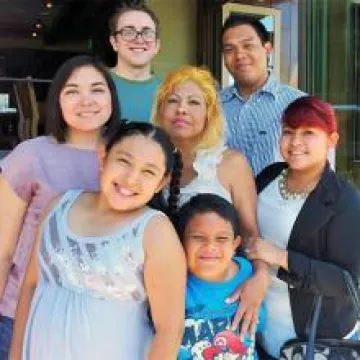
Heidi Nielson (Class of 2015) and Andy Hall (Class of 2015) got their client out of detention on bond in spring 2014. Since then, based on an application establishing that our client was the victim of severe domestic violence, she received work authorization and protection from deportation. In the photo at left Andy and Heidi celebrate her release from detention with our client and her U.S. citizen children.
Alexia Brooks (Class of 2012) and Edwin Molina (Class of 2012), prevented the deportation of a young man who has lived in this country since he was nine months old. He has three young U.S. citizen children and a legal permanent resident fiancée. In the photo below, our client holds the judge’s order closing his deportation case, flanked by Alexa and Edwin. Also pictured are former clinic co-director Nina Rabin (front row, second from right) and the clients’ sisters, mother, fiancée, and infant son.
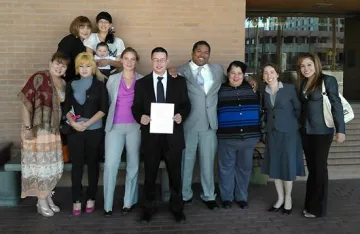
Molly Kincaid (Class of 2013) and John Champagne (Class of 2012) represented an Ethiopian asylum seeker who feared persecution if deported. She fled Ethiopia after enduring two lengthy periods of imprisonment and torture by the government due to her involvement in peaceful political protests. She was kept at the Eloy Detention Center for nearly nine months awaiting her asylum hearing. After her release, the clinic worked to ensure that her husband and two children were able to join her in the United States.
Rachel Corrigan (Class of 2012) and Lauren Pylipow (Class of 2012) successfully represented a family (below) who needed a special waiver to keep their green cards and stay in this country legally. The mother and her two sons, now 20 and 21, were facing deportation after living here for more than 14 years. The family had been victims of domestic violence and harassment by a U.S. citizen for years. With their legal status resolved, both sons were able to continue their education and other activities: the younger one volunteered helping disabled children and the older one was kept busy by his three-year old U.S. citizen daughter.
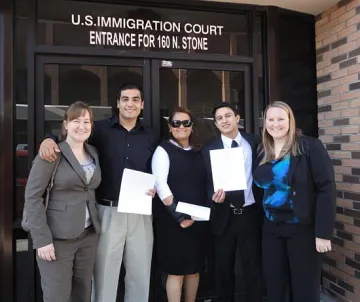
(Above) Law students flank their clients outside Immigration Court in Tucson. See "Family Victims of Domestic Violence Earn Waiver to Keep Green Cards" in the Success Stories below:
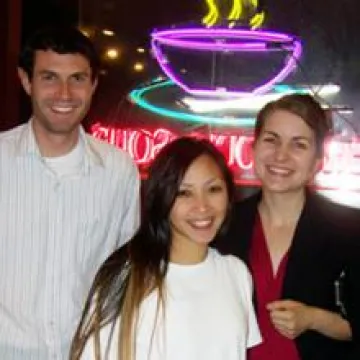
This client (center) stands with students Laura Belous and Calvin Jones (both class of 2010) outside a Vietnamese restaurant on the night she was granted a humanitarian waiver of removal and released from 13 months of detention. She was soon reunited with her family in California.
Kristi Whitaker Trinks (Class of 2012) and Esther Brilliant (Class of 2011) won asylum for an African woman who survived severe persecution, fled halfway around the world, declared asylum at the U.S. border, and was detained in Eloy for more than nine months. The students worked closely with an interpreter to build trust with our client, prepared extensive legal arguments, identified and prepared expert witnesses, and handled all aspects of the hearing.
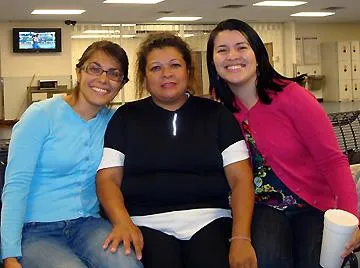
Rigel Massaro and Sohar Quinteros (both Class of 2009) assisted our client in applying for a visa based on extensive domestic violence that she suffered at the hands of her U.S. citizen spouse. Here, the client, flanked by Rigel and Sohar, awaits a bus that reunited her with her family in Nevada after nearly a year of detention. Kristi Whitaker Trinks (Class of 2012) helped in the final stages of her case.
Joanna Gauguin and Linda Imonode (both Class of 2010) represented an Afghani client who, along with his family, had suffered horrifying atrocities at the hands of the Taliban. The judge granted him a humanitarian waiver of deportation and, after months in detention, he was able to reunite with his mother, sisters, and cousins in California.
Erin Simpson's (Class of 2001) worked on the case for Javier Guevara, gathering documents and co-producing a videotape that convinced the INS district director not to proceed with Mr. Guevara's deportation.
Watch a video about Mr. Guevara's case:
Who We Are
Lynn Marcus is director of the Immigration Law Clinic (ILC) and the Community Immigration Law Placement Clinic (CILPC). She launched the ILC as part of the Florence Immigrant and Refugee Rights Project in 1995, and continued as the ILC’s director when the University of Arizona became the program's home in 1997. Before then, Professor Marcus worked for nearly every non-profit organization in Southern Arizona that provides legal services to immigrants, initially raising grant money to monitor conditions at immigration detention facilities and to write and distribute self-help pamphlets for pro se immigrants in deportation proceedings. She has represented immigrants in immigration court, before the Board of Immigration Appeals, in federal district court, at the 9th Circuit Court of Appeals, and before the U.S. Supreme Court. In the Fall of 2000, Professor Marcus launched the CILPC, in which students are placed with non-profit or private immigration law offices and also engage in an in-house project interviewing asylum seekers. Professor is president of the Asylum Program of Arizona and a member of the American Immigration Lawyers Association and has co-chaired the Immigration Section of the State Bar. She also taught a refugee law seminar for twenty years. Professor Marcus graduated from NYU School of Law in 1989.
